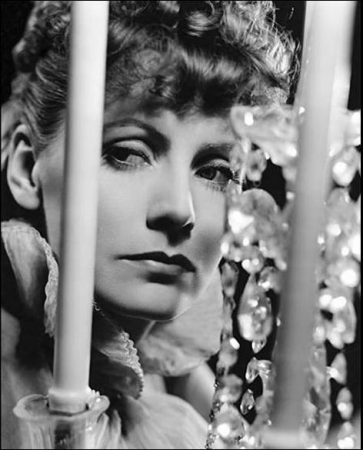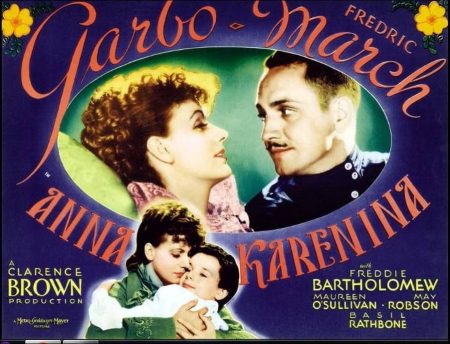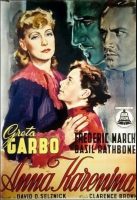Anna Karenina (Greta Garbo) is the wife of Czarist official Karenin (Basil Rathbone). While she tries to persuade her brother Stiva (Reginald Owen) from a life of debauchery, she becomes infatuated with dashing military officer Count Vronsky (Fredric March). This indiscreet liaison ruins her marriage and position in 19th century Russian society; she is even prohibited from seeing her own son Sergei (Freddie Bartholomew), with eventual dire results.
This version of the Tolstoy classic lingers longer in Moscow during the weeks that follow the initial meeting of the starstruck lovers-to-be Vronsky and Anna Karenina. The story — as it unfolds — also focuses on Kitty, a young woman who is related to Anna’s sister-in-law whose marital rift has brought Anna to Moscow. Until Anna shows up, Kitty had hopes of getting Vronsky, who is single and well connected, to propose to her. Ignored by Vronsky, Kitty turns her attention to another suitor, a man who seems to have a lot in common with Tolstoy.
Anna Karenina is a 1935 Metro-Goldwyn-Mayer film adaptation of the 1877 novel Anna Karenina by Leo Tolstoy and directed by Clarence Brown. The film stars Greta Garbo, Fredric March, Basil Rathbone, and Maureen O’Sullivan. There are several other film adaptations of the novel.

In New York, the film opened at the Capitol Theatre, the site of many prestigious MGM premieres. The film earned $2,304,000 at the box office, and won the Mussolini Cup for best foreign film at the Venice Film Festival. Greta Garbo received a New York Film Critics Circle Award for Best Actress for her role as Anna. In addition, the film was ranked #42 on the American Film Institute’s list of AFI’s 100 Years…100 Passions.
Writing for The Spectator in 1935, Graham Greene made much of Greta Garbo’s powerful and theatrical acting in the film, noting that “it is Greta Garbo’s personality which ‘makes’ this film, which fills the mould of the neat respectful adaptation with some kind of sense of the greatness of the novel”. Greene found that the pathos that Garbo’s acting brings to the picture overwhelms the acting of all supporting cast save that of Basil Rathbone.
Helen Brown Norden from Vanity Fair in a glowing review wrote “Against the glittering background, these people move to their inevitable doom. There seems more of anguish and more of sombre depth in this version than there was in the old silent film (with Garbo and John Gilbert). Garbo still with that remote look of “the implacable Aphrodite” on her face acts with a dignity and a bitter passion which reach a mature climax in the final scene.”
Anna Karenina (1935)
Directed by: Clarence Brown
Starring: Greta Garbo, Fredric March, Freddie Bartholomew, Maureen O’Sullivan, May Robson, Basil Rathbone, Reginald Owen, Phoebe Foster, Reginald Denny, Gyles Isham, Joan Marsh, Ethel Griffies
Screenplay by: S.N. Behrman, Clemence Dane, Salka Viertel
Cinematography by: William H. Daniels
Film Editing by: Robert Kern
Costume Design by: Adrian
Art Direction by: Cedric Gibbons
Music by: Herbert Stothart
MPAA Rating: None.
Distributed by: Metro-Goldwyn-Mayer
Release Date: August 30, 1935 (New York City)
Views: 263







